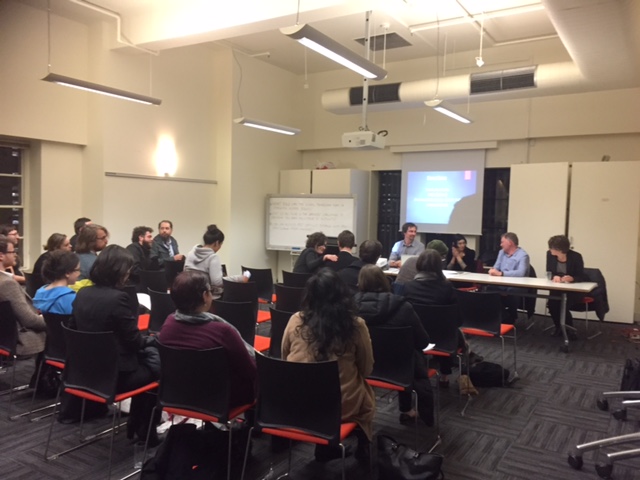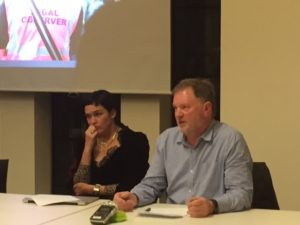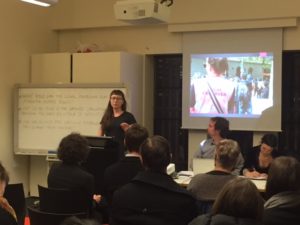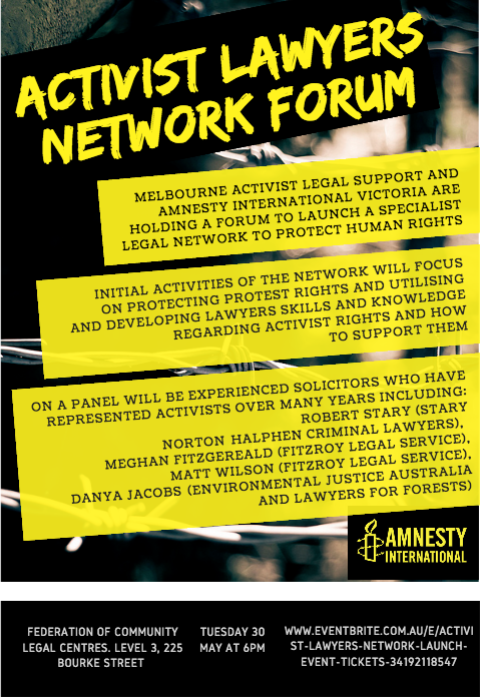Our Activist Lawyers Network is launched!
A report on the launch of the Activist Lawyers Network

Melbourne Activist Legal Support (MALS) launched our lawyers network with Amnesty International-Victoria on the 30th May 2017.
We heard from several lawyers with combined decades of experience in supporting activists and progressive causes – Matt Wilson (MALS) Rob Stary from Stary Norton Helphan, Meghan Fitzgerald from Fitzroy Legal Service and Danya Black from Environmental Justice Australia.
Rob Stary is well known in Melbourne for providing pro bono representation for activists, but also for working with people who have little resource and need support – his work for the people who other lawyers won’t touch is written about more in this recent article.
He shared a strong perspective on the trends of policing that we have seen in the last decade – describing them as “effectively a paramilitary force”.

One recently introduced piece of legislation was highlighted, the charge of “resisting emergency services workers” which now comes with a mandatory 6 month imprisonment… like so many laws, may have been purportedly designed for one purpose – in this case, a need to protect the important work that emergency workers do, but could be used against activists. He advised lawyers who may be briefing activists to be careful about how they talk about “resisting arrest” charges.
He also talked about patterns of police intelligence gathering. Many groups suspected of terrorism, no matter how tenuous the links, are infiltrated, and of course we all know that even peaceful activist groups are regularly surveilled and infiltrated. They will position themselves as just wanting “a friendly chat” and that they are concerned about them (you are the good guys, we are concerned about the bad guys) which will on
One case study that Stary referenced was the introduction of laws around “supporting directly or indirectly” terrorism. There was a deliberate attempt in 2007 to disrupt the funding of the Tamil Tigers in Sri Lanka… being that “one persons terrorist is another’s freedom fighter” this can be problematic and a number of organisations who work with oppressed minorities in other countries have found themselves targeted with little option for recourse.
In this instance the Sri Lankan diaspora worldwide was supporting humanitarian efforts, and because Australia has no Bill of Rights it was targeted as the best country to stop the flow of resources. People were threatened with supporting a terrorist organisation, even as they sent money to aid and hospitals, and 100 warrants were issued for members of Tamil community. Many houses were raided. 40 000 innocent civilians were slaughtered in 2009. Stary believes that the efforts to send aid were important in providing healthcare and aid during this time.
And finally he reminded us that due to funding cuts to the community legal sector that you can only get legal aid if there is a realistic prospect of imprisonment. In short, we need pro bono legal support for progressive activists now, more than ever
Meghan Fitzgerald has a long history of providing legal support for progressive causes – working with Fitzroy Legal Service, who publish the brilliant activist rights website. She spoke about some successes and some losses – this has included important legal work such as advocating for the right of freedom of speech and assembly after the evictions of Occupy Melbourne – a case that was badly lost, she wryly commented, “lost it brutally, but fought it valiantly”… noting more broadly in an analysis we agree with, that whilst many painted Occupy as a failure, that worldwide it served to shift the discourse on economic justice, as well as provide important training and learning opportunities, and a new sense of community, for a generation of activists, “If it was a failure I was happy to participate in it,” she said.
Another important campaigns was a case in support of halting the East West Link construction. They legally argued the government was acting as a corporation, and called them on failing accountability to the community.

And one of the most inspiring groups she said she was worked with were the homeless community, through the Homeless Persons Union and their supporters, at the Bendigo St stockade – a six month long occupation of houses in Collingwood – the campaign involved communication, legal education, and supporting the discourse around urgent need for more public housing – with 30 000 people on a waiting list currently.
She also talked about how allies are conscientiously exercising their privilege to support and ensure voice is given to the people impacted by the issue. (And also noted that groups like RISE – refugees with lived experiences were important to support)
She also noted the long hours of work involved and the slow process of gained community trust, needing to work to consensus models and the unusual situation of being instructed by a collective, but noted it was the most rewarding work she had done saying, “supporting people who act in civil disobedience should be core duty for lawyers.”
Danya Jacobs has been a long time forest activist, and now a lawyer representing forest activists, and environmental causes – she has participated in substantive environmental law work.
She stated, “protest and civil disobedience has a long and proud history in protecting australia’s environment,” and noted an increasing level of sophistication from grassroots activists groups, such as (our fellow FOE affiliate) GECO who are using an effective mix of on ground direct action, in the form of citizen science, with protest and public advocacy.
This has come about (and been used successfully around the country in other campaigns we have supported such as Broome’s campaign to stop a gas hub, and their community science whale watching program) from a long history of grassroots activist’s DIY approach – they have educated themselves on the issues – it’s not about deferring that work to experts and government.
They have fundraised for the tools and now bring more people to understand and know the issue by community science camps, fauna surveys and using tools such as remote sensor cameras. This can then be combined with important legal work, such as the Brown Mountain case and others – as lawyers can use this data for legal challenges.
She has worked to support activists facing criminal charges for simply trespassing to survey the areas that Forestry Victoria haven’t, as well as people who use nonviolent direct action as a last stand to protect forest areas whilst other legal and political processes are in train, noting that it is an ongoing challenge to keep up with the laws that governments keep introducing to further criminalise this work.

Overall, it was an excellent informative evening, and it was brilliant to see 20 lawyers there, interested in becoming involved in supporting human rights, and environmental and social justice issues by providing pro bono support.
If you are a lawyer with a practicising certificate in Victoria, you can sign up to the lawyers network here. MALS will be providing training and support to lawyers to understand the needs of activists, and Amnesty International is coordinating the work. You can read about some of the roles lawyers can play in the network here.
If you are a lawyer interstate, check in with us at CounterAct – we often have a need for legal collaborators around the country.
If you are interested in getting involved with MALS we need volunteers – you don’t need to be a lawyer – we provide legal observers to events, “Know your rights” education sessions, and more.
With thanks to Amnesty International- Victoria, the Federation of Community Legal Centres, and all the MALS crew.
Nicola Paris,
Counteract
CounterAct supports and works with MALS and has found our work increasingly overlapping in recent years.